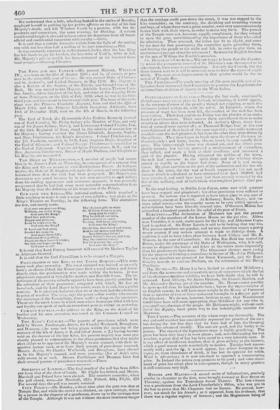DisTunitAxcr.; i o Ii. o: I.A N D.—During the last
week, considerable disturbances have toollea place in Ireland, originating, it wotold appear, n the extreme distress of the pc o1: ; though not stopping, as such dis- ttorbances indeed seldom do, with its edict*. At Limerick, where the
pressure of want has been most felt, the conduct of the mob has been
most 0• ii Their first exploit (no Friday was the plunder of an Unde-
fended provision-store. Their success there embtddeued them to make attacks on others that were defended. At Arthur's Quay, above four
tons of oatmeal were carried off ; at Thomond Bridge, to or live cars
were lightened of their loads of tlte same material ; two mills were next assailed—one the mob plundered, but from the other they were driven by
the military. They then begau to break open the shmos of the town in- discriminately ; ant hams, bacon, cheese, bread, LeC;i111C tsjooe1h v their
prey. The boater-weigh house was cleaned mot, and doe sitters com- pletely routed; but having procured a reinforcement of victuallers, they rallied, and made a daslo at their assailants, and recovered a part of the plunder. Having exhausted the edibles of the town, the mob had recourse to the spirit-sloops and the whiskey disap- peared as rapidly as the butter had done. None of it was recap- tured. By great exertion on the part of the authorities and the few sol- diers in the town, the riot was at length suppresseel ; but not until dounage which is calculated to have amounted to at least 10,0001. had loece sestaineol, and until four men had been severely wounded by the fire uf the military, amid of individuals who sought tel protect their pro- perty. In the road leading to Dublin from Cavan, some cars with potatoes have been stopped and plundered ; bat other provisions svere suffered to
preceed. ..tNo serious riot is reportA to have taken place in any part of the country, except at Limerick. At Kilkenny, Ennis, Derry, and va- rious other towns,—for the scarcity seems to be very widely spread,— subscriptions have been liberally entered into. O'Gorman •Mahou has subscribed a hundred pounds for the relief of thepoor of Ennis.
ELEerioss.—The declaration of Ministers has put the greater number of the members of the Lower House on the gat' rive. Alder.
man Venables, it is said, starts again for the City, and Alderman Cope.
hood is spoken of. Sir Peter Laurie is said to be looking that way too. The present members are popular, and we may therefore expect a pretty severe contest if any serious attempt is made to dislodge them. A coalition is said to have taken place between Lord Clifton and Mr. R. Watson, in the case of Canterbury. Sir John Rae Reid has started for Dover, under the patronage of the Duke of Wellington, who, it is said, means to dispense the loaves and fishes to the voters more impartially than his predecessors have done. The Gloucester electors meet matey firr the purpose of forming a committee in favour of Mr. Jolon Philpotts. Two new members are promised for Great Yarmouth, ,amid Sir Roger Grissley intends to canvass Durham, on the retirement of Sir Henry 11 a rdi nese
11 IlusrE.—Mr. Hume has been invited to stand for Middlesex;
and from the numerous and respectahle array of supporters which the list of his election-committee exhibits, we have little doubt that he will be returned. Lord Althorp, Sir James Graham, Sir Francis Burdett, and Mr. Alexander Baring, are of the number. Mr. Hume cannot possibly be more useful than he hots hitherto been ; but as the representative of an English county, he will have more weight in the House of Commons than as member of two or three unknown boroughs in a distant part of the kingdom. We do not, however, hesitate to say, that Westminster
would have been still more appropriate than Middlesex for one who is, 1,1i: excellence, the man of the people. Mr. Iloblionse might, without sacri- fice a his dignity, have given way to the indefatigable member for Montrose.
Tit r. Cnors.—The accounts of the wheat crops are favourable. The wet and cold weather buts considerably repressed the growth of the ear; but during the few tine days that we have had of late, the blooming process has advanced steadily. The oats ;ore good, and the barley is vie porous. The report of the leguminous crops is loigItly gratifying. The grass has been very heavy in most places; and, notwithstanding the wet weather, a great deal of hay has been saved in a very tolerable state. It is one effect of indifferent weather, that it gives activity to the fitrmers, which a good season tends wonderfully to deaden. Turnips look uncom- monly well ; and the 11,v, it would appear, has either foregone its ra- vages, or, from abundance of drink, it has lost its appetite for solids.
Wool is advancing; it is now admitted to approach a remuneratieg price. In Ireland the potato crop promises to be good ; and some abate- ment of price has taken place in consequence, though in many quarters it still continues very high.


























 Previous page
Previous page